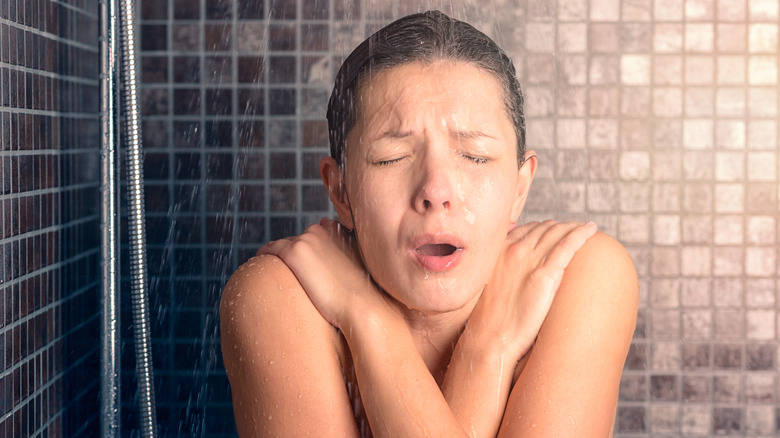Simple Tricks For Beating Jet Lag For Good
Feeling fatigued in Florence, tired in Tokyo, or sleepless in Seattle? You may well be jet-lagged. Jet lag is a temporary sleep disorder that affects many of us when we fly across multiple time zones. When we're jet-lagged, our body's internal clock is out of sync with the time cues in our destination. Symptoms can vary: You may have trouble sleeping at night or start dropping off during the day; there is often a general feeling of exhaustion; and you may have issues with concentration and memory.
There is no way to fully prevent jet lag. Even melatonin hasn't been proven to have a significant effect on jet lag. However, there are some things you can do to beat jet lag that won't cost you a cent. So, when you're drowsy in Dubai or wired in Wisconsin, try these tips, but be warned, some are more pleasant than others.
Wash it off
Here's our first trick: You can (kind of) wash off jet lag. If you're feeling sleepy and need a quick energy boost, try taking a cold shower. According to WedMD, taking a cold shower in the morning can give you a boost of energy and increase circulation. Given that, jumping under an invigoratingly chilly stream of water at any time of the day should help wake you up. By chilly, we mean 50 to 60 degrees Fahrenheit; you don't need to plunge into 35-degree water.
On the much more pleasant flip side, if you find that you're wide awake in the middle of the night, taking a warm bath might ease you into sleep. Research in Sleep Medical Reviews shows that hopping in the tub around 90 minutes before bedtime can help your body regulate your core temperature, preparing you for sleep. The bath temperature should be around 104 degrees Fahrenheit, and you only need to be in the tub for as little as 10 minutes to see a benefit. Another hygiene tip that might help you beat jet lag includes brushing your teeth; travel writer Ramsey Qubein talking to Reader's Digest says that doing this can help wake you up.
Other simple tricks
If you don't fancy putting your aching body through the rigors of a cold shower, a brisk stroll could do. Speaking to Cleveland Clinic, exercise physiologist Zach Carter says that a 10-minute walk can be even more beneficial than a cold shower. There is some evidence to suggest that doing some exercise can help your circadian rhythm adjust to a new time zone faster. However, researchers note that it's difficult to separate the benefits of exercise from the benefits of being exposed to daylight.
This brings us to the tried and true methods of helping your body adjust to a new time zone. Light exposure at the correct time (daytime in your destination) and trying to sleep only at nighttime are the two main things you can do. This may involve changing your sleep schedule before you fly and booking a flight that lands in the early evening to avoid accidentally having a nap.
Finally, one tip published by Harvard Medical School is to engage in a 12-to-16-hour fast before and during your flight and then, on landing, eat a large meal. Dr. Clifford Saper posits that a brief fast like this can reset your circadian rhythm. Always check with a medical professional before fasting. Baths, showers, and a walk around the block are free and safe, so there's no harm in trying them to beat jet lag.


